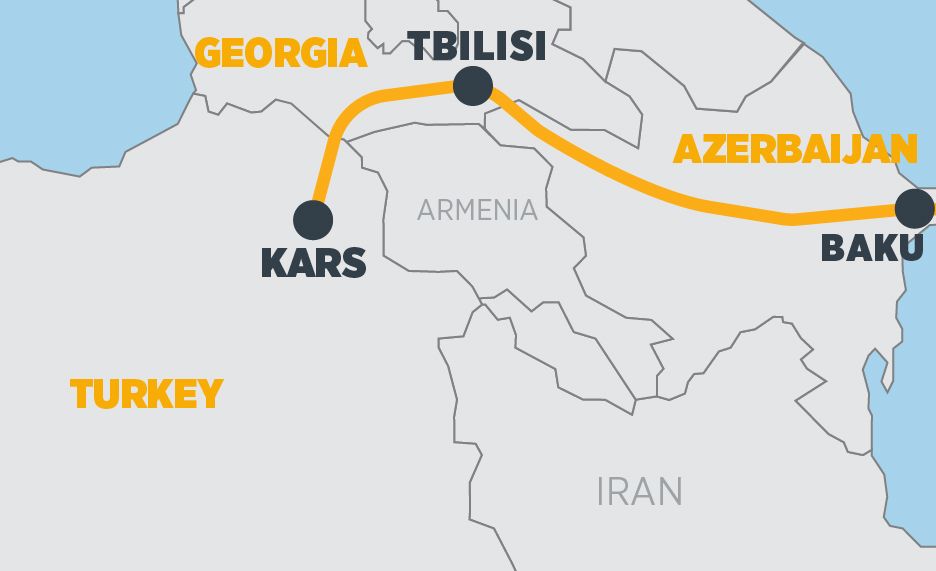WNAM MONITORING: The recent arrival of a delegation from Azerbaijan to Georgia, led by Chairman Rovshan Rustamov of Azerbaijan Railways CJSC, to assess the restoration and reconstruction efforts on the Baku-Tbilisi-Kars (BTK) railway line marks another significant step in the strategic partnership between Azerbaijan, Georgia, and Turkey. The BTK railway, connecting the three countries, has emerged as a vital artery for regional connectivity and economic development, facilitating trade and transportation across the region.
Initiated as a trilateral project, the BTK railway has garnered attention for its potential to bolster economic ties and infrastructure development among the participating nations. The recent visit underscores the commitment of Azerbaijan, Georgia, and Turkey to further enhance the efficiency and capacity of this crucial transport corridor.
The Baku-Tbilisi-Kars railway line, inaugurated in 2017, represents a milestone in regional cooperation. It provides a direct rail link between the Caspian Sea and the Mediterranean, offering a shorter and more efficient route for transporting goods between Europe and Asia. By bypassing traditional routes through Russia and Iran, the BTK railway reduces transit times and costs, thereby enhancing the competitiveness of regional trade.
Rovshan Rustamov’s meetings with railway officials from Georgia and Turkey highlight the collaborative efforts to maximize the potential of the BTK railway. Discussions will focus on completing pending infrastructure works, optimizing operational processes, and devising strategies to increase cargo transportation volumes. Such deliberations underscore the commitment of the participating countries to continually improve and expand the railway’s capabilities.
Enhanced cargo transportation along the BTK railway holds significant economic benefits for all involved parties. Azerbaijan, endowed with substantial energy resources, seeks to diversify its economy by leveraging its strategic geographical position as a transit hub. The BTK railway provides Azerbaijan with a vital link to European markets, allowing it to export energy resources and other goods more efficiently.
For Georgia, the BTK railway represents a gateway to broader regional integration and economic development. As a transit country, Georgia stands to benefit from increased trade flows and transit revenues. Moreover, improved connectivity enhances Georgia’s attractiveness as a logistics and transportation hub, attracting investment and fostering economic growth.
Turkey, as a key player in the project, stands to gain from enhanced connectivity with its neighbors and expanded trade opportunities. The BTK railway aligns with Turkey’s vision of becoming a bridge between Europe and Asia, reinforcing its position as a pivotal transit country. By strengthening its transportation infrastructure, Turkey aims to bolster its economic influence and regional connectivity.
Beyond economic considerations, the BTK railway holds broader geopolitical significance. The project underscores the commitment of Azerbaijan, Georgia, and Turkey to foster regional cooperation and stability. By investing in infrastructure that promotes connectivity and integration, the three countries contribute to peace and prosperity in the South Caucasus region.
However, challenges remain in fully realizing the potential of the BTK railway. Infrastructure upgrades, logistical enhancements, and regulatory reforms are necessary to streamline operations and attract greater investment. Moreover, geopolitical dynamics and regional conflicts pose risks to the stability and viability of the project.
The visit of the Azerbaijani delegation to Georgia to assess the Baku-Tbilisi-Kars railway line signifies the ongoing collaboration and commitment of Azerbaijan, Georgia, and Turkey to strengthen regional connectivity and economic integration. By harnessing the potential of this vital transport corridor, the three countries pave the way for enhanced trade, prosperity, and stability in the South Caucasus and beyond.


